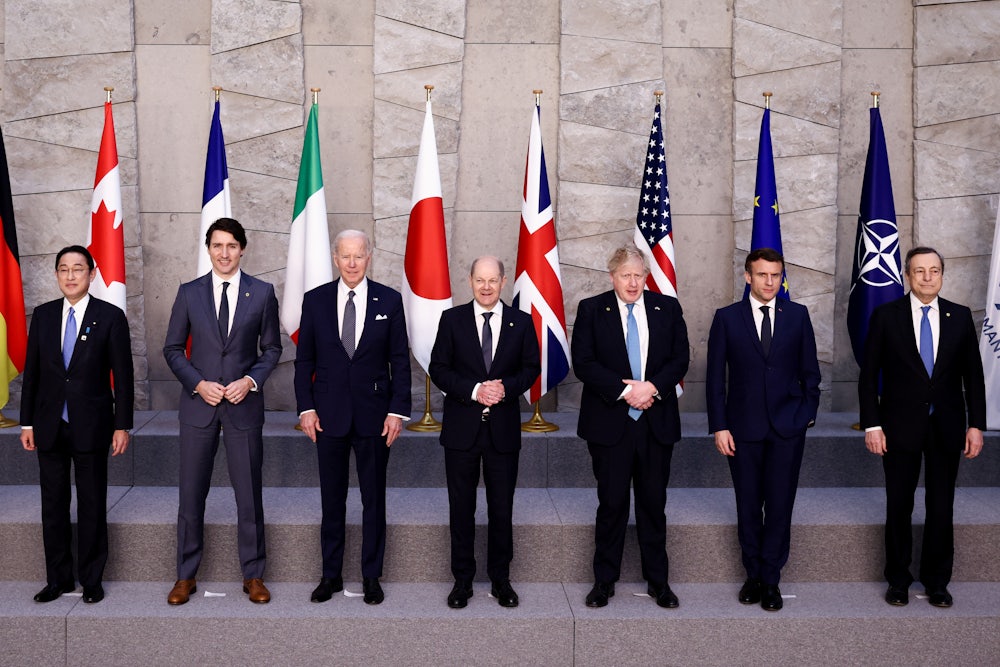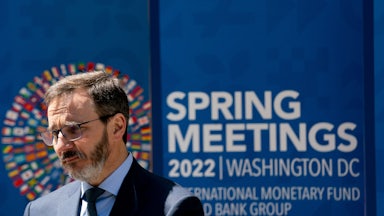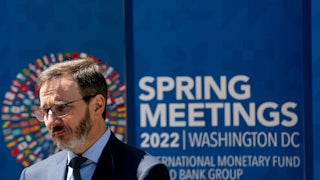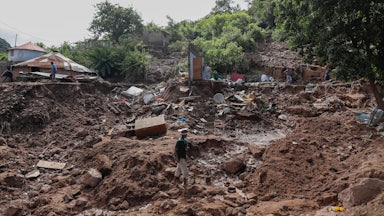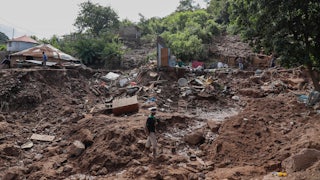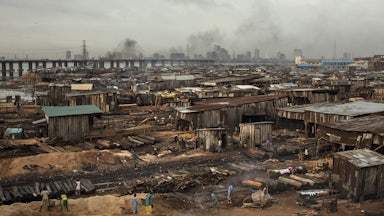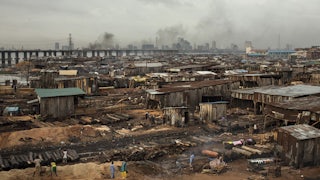When Johannes Müller built the palatial Schloss Elmau in the German Alps, he intended it to be a refuge from materialism and capitalism. Now a luxury spa resort, on Sunday it will host the leaders of the G7 as they convene to discuss the future of our planet.
German Chancellor Scholz declared, when Germany took over the presidency of the G7 in January, that the group would prioritize “the pursuit of climate neutrality and an equitable world.” With global inequality higher than ever, debt rising to unprecedented levels, and climate change happening faster and causing more serious damage than previously thought, the G7’s track record isn’t great; its solutions have been at best laughably inadequate and at worst actively harmful. If it’s serious about achieving Scholz’s goal, it needs to try something new: It must cancel the debt it holds over the global south.
Traditionally, climate activists haven’t focused on debt, Argentine scientist and activist Esteban Servat told me. Similarly, labor and social movements are not aways focused on climate. But tackling the grossly unfair global system of debt diplomacy is the kind of populist proposal that can generate widespread working-class support linking disparate groups. After all, “who’s going to defend the [International Monetary Fund]?” Servat asked me. “Everyone knows they’re assholes.” Servat has spent months building Debt for Climate, a global movement connecting climate and debt justice. While the G7 meets, Debt for Climate will demonstrate in over 40 countries to demand that the global north take debt cancellation seriously.
Debt and climate are “mutually reinforcing” crises, according to a recent report by Olúfẹmi O. Táíwò and Patrick Bigger for the Climate and Community Project, an academic network translating climate justice goals into public policy. Countries in the global south, which are often more vulnerable to climate change, are expected to pay billions of dollars each year to service their debts. That’s money that could be going toward adapting to a changing climate, reducing poverty, and improving public health, which global warming is expected to devastate. Instead, poor countries are sending money into the coffers of wealthy nations and corporations. (Since 1980, over $4 trillion in interest payments has been sent from the global south to the north.) When disasters do strike—as they are with increasing frequency and intensity—indebted global south nations are less able to manage. Scrambling and strapped for cash, they are forced to seek out yet more loans. As if this vicious cycle were not bad enough, those loans are almost always conditional; the conditions are, of course, to further reduce public spending and implement policies of austerity.
These policies were meant to be a thing of the past. In the 1980s, a devastating debt crisis swept throughout the global south. In response, the IMF and World Bank implemented a swathe of neoliberal reforms called Structural Adjustment Programs, or SAPs—otherwise known as austerity. They aimed to transform Southern economies, demanding reduced government spending, trade liberalization, and privatization in order to ensure the continued northward flow of debt service payments. The result for the global south was, Ndongo Samba Sylla writes, a decades-long “descent into hell.” Debt ballooned. Inequality skyrocketed. Economies contracted. Environments degraded. Years of progress were lost.
In 1996, rich countries implemented a limited program of debt cancellation. Táíwò and Bigger note that the 37 countries that applied for this program did end up paying less servicing their debts and more on poverty-reduction programs over the next several years. But it was not nearly enough to break the vicious cycle of debt that had caused the crisis in the first place—a cycle that is nearing breaking point again today.
Even before the pandemic, debt in the global south was becoming unmanageable; according to Táíwò and Bigger it has since increased to levels similar to or worse than those that precipitated the ’80s crisis.
In the absence of debt cancellation, nations in the global south are forced to exploit their natural resources. In lieu of receiving yet more loans, Táíwò and Bigger explain, this is often the only method available to these nations for generating the foreign currency needed to service their debts. That might mean slashing and burning rain forests for plantation agriculture in Indonesia, expanding mining in Zambia, or opening untouched nature to fracking in Argentina.
The Argentina example looms particularly large in Servat’s mind. Over the last decade, the nation has attempted to break its centuries-long cycle of debt crises—it has received no fewer than 20 debt-inducing IMF deals—by doubling down on fracking. In 2018, the cycle once again came to a head. That year, Argentina received the largest loan in IMF history—to reinsure payment of existing debt. It came with the usual austerity requirements: Public spending was cut and interest rates raised, making life more difficult for the millions of people already struggling to put food on the table. Around the same time, Servat was living in an eco-community atop Vaca Muerta, the world’s second-largest shale gas basin. In March 2018, he published leaked documents indicating that a pilot fracking project had contaminated the local water table. The resulting harassment and death threats forced him and his family to flee to Germany; the fracking continued.
By the end of the year, Argentina had sunk into a recession. Róger Calero and Martín Koppel note that its debt to “imperialist banks and financial institutions” is now approaching the total foreign debt owed by all of Latin America in the middle of the ’80s debt crisis, and the nation is once again negotiating a deal with the IMF. What is that—its twenty-second? Twenty-third? Meanwhile, 40 percent of its kids are malnourished and some 10 million people rely on food assistance; each year, increasingly devastating climate catastrophes—floods, droughts, wildfires—push yet more people into poverty.
In the long term, extractive industries are the main driver of ecological destruction and a major contributor to climate change, which will in turn push the global south into further indebtedness because countries more vulnerable to climate change face higher borrowing costs. So the cycle continues.
Nations in the global south are ready and willing to leave their fossil fuels in the ground; right now, they just can’t afford to. In 2007, for example, the newly elected president of Ecuador, Rafael Correa, pledged to leave untouched a vast amount of oil lying under the Yasuní national park. In return, he sought an international commitment worth at least half of the expected revenues that extraction would provide over the next decade. These contributions would form a fund, the interest from which would fund sustainable initiatives. Hailed as a groundbreaking plan, by 2013 it was canceled. The world had pledged less than 10 percent of what Correa sought, and less than 10 percent of that pledge was delivered—a measly $13.3 million. Correa condemned the “hypocrisy” of the global north. “It was not charity that we sought,” he explained, “but co-responsibility in the face of climate change.”
Calling rich and poor countries “co-responsible” for climate change, however, understates Correa’s case. Historically, responsibility for the climate crisis lies overwhelmingly with the global north, which as of 2015 was responsible for over 90 percent of global excess emissions. In this sense, the North owes its own debt—one both ecological and moral, built up from centuries of colonialism, of brutal imperialist extraction. Ecuador-based Acción Ecológica defined it as “the debt accumulated by the Northern industrial countries toward Third World countries on account of resource plundering, environmental damage, and the free occupation of environmental space to deposit wastes.”
The global north has not been paying its dues. Its current goal is to disburse $100 billion in climate finance each year—a modest and insufficient goal that rich countries have yet to meet, even though it includes private investment and—you guessed it—debt-creating loans. Other initiatives, such as debt-for-nature swaps—where debt is forgiven in return for the establishment of ecological policies determined by the creditor—are merely “ornamental ways to greenwash their way into furthering extraction and exploitation,” Servat said.
After all, the global north is not just refusing to repay its debt—it’s building on it. Jason Hickel, an academic whose research focuses on global inequality and ecological economics, calculated that in 2015 alone the global north extracted over $10 trillion from the global south. In other words, the net value of embodied land, raw materials, energy, and person-years transferred from the South to the North in a single year was more than 30 times the total aid sent from the North to the South. “Apartheid principles,” Hickel says, “operate at the heart of our global economic governance system.” The IMF and World Bank were, he argues, colonial creations with inequalities intentionally baked in. The United States has veto power, for example, and the G7 controls a majority of the voting shares.
What Servat and countless others from the global south—and around the world—are proposing is that the global north use its power to cancel hundreds of billions of dollars in debt. Use it to pressure other creditors, such as nations like China or private corporations. Use it to break the reinforcing cycles of debt and climate crises burdening the global south, which would then have more freedom to manage its own future. Debt cancellation would be, in other words, a radical act of worldmaking that, while possible under current institutions, would push the Overton window—pave the way—toward a transition to Scholz’s stated goal of a climate-neutral and equitable world.
